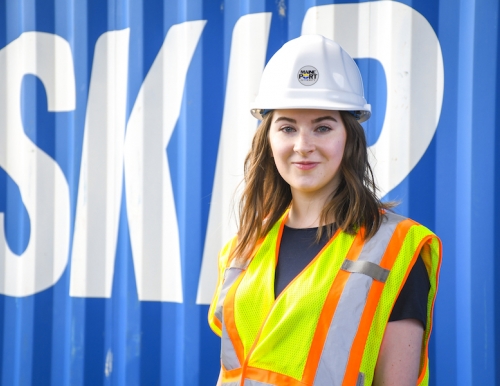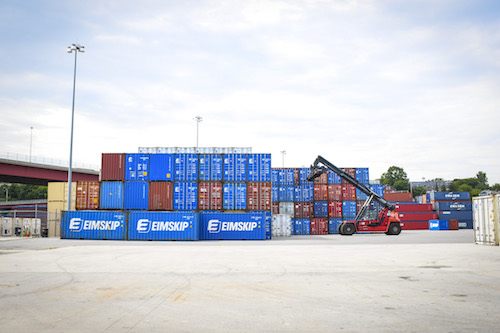
On a hot and humid day in early August, at the International Marine Terminal (IMT) on Commercial Street in Portland, wearing a hard hat and yellow vest, Shaelan Donovan ’18 posed for a photo against a blue shipping container.
Surrounded by massive machines lifting the metal boxes, stacking them into neat rows, the senior Economics student at the University of Southern Maine (USM) looked out over the container yard.
“It’s good to be back,” said Donovan, who hails from Kennebunk and interned at the IMT in the spring of 2017.
She recently returned from Iceland, where through a unique partnership between USM and Reykjavík University (RU), she was able to take business classes while advancing her career in international trade — the first USM student to do so.
“It’s interesting because (Reykjavík) is definitely bigger than Portland, but it’s similar,” she said of the Nordic country’s capital.
The two universities signed documents to develop a comprehensive academic partnership in 2016. In 2017, USM President Glenn Cummings and Ari Kristinn Jónsson, president of RU, expanded their relationship to provide more opportunities for student and faculty exchanges with a particular focus on internships.
While Donovan is the first USM student selected to take advantage of the formal exchange program with RU, she’s certainly not the first to explore what Iceland has to offer.
In the summer months of 2017, several groups traveled to Iceland from USM — including students from the Tourism and Hospitality Program, the Honors Program, Maine Regulatory Training and Ethics Center, the USM School of Business and the Muskie School of Public Service — all taking in the incredible landscapes and learning about the Icelandic way of life.
But Donovan’s exchange was trailblazing.
Starting at Home
Donovan started her voyage in international trade at the IMT, where she worked as an intern during the spring semester of 2017 performing research projects and building business systems for the terminal’s clients. She said the experience was transformational in her understanding of global economics.
“My economics degree is really important for me,” she said.
While internships at the IMT are no doubt beneficial for students as they gain real-world experience, they also have tremendous rewards for those charged with managing Maine’s imports and exports.
David Arnold, chief executive officer of Soli DG, the company that manages the IMT on behalf of the Maine Port Authority, said Donovan was well-prepared for her work on the terminal. He credited her education at USM for giving her the skills necessary to keep up with the workload.
“One thing the job requires is to be able to change gears quickly … Shaelan had no trouble working in that fast-paced, rapidly-changing environment,” Arnold said. “Her education served her well. She did phenomenal work.”
Trade supports 180,500 — or 1 in 4 — Maine jobs, according to the Maine International Trade Center (MITC), of which USM is a part. Since 2009, Maine jobs related to trade increased by 25.9 percent, meaning the need for skilled workers is apparent.
“The workplace is only as good as its people, so bringing in people with a good attitude who are willing to learn and do great work, like Shaelan, can make a huge difference,” Arnold said. “As a small port, we’re constantly trying to grow and innovate so the impact that one person can have is massive, good or bad.”
Icelandic shipping company Eimskip selected Portland as its North American headquarters in 2013, and the market reach that Maine businesses have as a result of Eimskip service has increased dramatically, Arnold said. According to the MITC, international container shipments from Maine increased by over 600 percent since 2009.
“Maine businesses have access to markets they’ve never had access to before,” Arnold said. “That really sets us up to grow.”
Donovan said she was drawn to the IMT because it functions as an economic linchpin for the state.
“What better avenue could there be to grow our economy?” she said.
Expanding Global Trade

Eimskip currently operates 60 offices in a network of 48 total countries, and employs about 1,700 people worldwide. It operates 21 vessels sailing on six routes in the North Atlantic.
According to Ross Hickey, assistant provost for Research Integrity at USM, when the Eimskip-Portland partnership was launched, it became as affordable to ship goods to Norway as it is to truck them to southern New Jersey. This principle of cost-based geography is critical to Maine’s continued expansion in the North Atlantic.
“Building ties with Iceland is a vitally important element in connecting to the North Atlantic culturally, academically and economically,” Hickey said.
Since 2013, when Eimskip first arrived in Portland, container volumes through the IMT have doubled. The Maine Port Authority and the Maine Department of Transportation have spearheaded a $20 million expansion of the facility that includes a new crane, a new reach stacker, improvements to rail facilities, construction of a new maintenance and operations facility, as well as improvements to the pier, Arnold said.
There were 9,682 container moves by water in 2017, up from 8,790 the year prior, Arnold said, in part because Eimskip now does a weekly run to the terminal as it delivers a variety of goods, including fish, foodstuffs, machinery and equipment.
Importing, Exporting Knowledge
Hickey said the partnerships between USM and RU, and Portland and Iceland directly benefit both economies.
“This partnership with RU will benefit our (and their) students by providing internship opportunities in the companies developing these growing business ties with Iceland and other countries in the North Atlantic,” Hickey said.
While abroad, Donovan worked in container management at Eimskip’s headquarters in Reykjavik, putting her studies in economics and business to work. Although, it wasn’t the first time she’d gotten a behind-the-scenes look at how the company does business.
Following the agreement between USM and RU, Eimskip announced a pilot project aimed at placing USM students in its Iceland office, and students from RU in its Portland office. Donovan took part in the project — working alongside the nearly 900 workers at the company’s headquarters in Reykjavik.
“What I appreciated most was my chance to do an internship at a foreign company,” she said. “This experience that I get to put onto my resume, employers will see that and think, ‘Wow that’s really unique.’”
While working at Eimskip in Reykjavik, Donovan said she was able to put into perspective how Maine’s economic limitations — a shrinking workforce and dependence on tourism dollars — can be remedied through a deeper focus on international collaboration.
“In my program, I thought a lot about Maine’s unique position — we’re economically struggling and one of the least ‘developed’ states, yet that lack of development is typically what people identify as being attractive to them,” Donovan said. “I’m interested in what we can do going forward to grow and develop Maine in sustainable, responsible ways, while maintaining the quality of life we enjoy now.”
Donovan said Maine can bolster its economic impact by taking advantage of its natural resources — including seafood, agriculture and acres of undeveloped public lands — in innovative ways; by growing and empowering responsible Maine companies; and by attracting more people to live in the state.
“I feel really strongly about growing Maine,” she said. “We need to empower Maine workers and get them out into the global climate.”
She said the similarities between Maine and Iceland, which has about one-fourth of Maine’s entire population, provide valuable lessons for each other as both countries expand their reach into the Arctic and North Atlantic.
Both locations are geographically isolated, she said, with rural populations that are becoming increasingly more difficult to care for. In Maine, she added, there is an over-reliance on tourism; Iceland, however, is just beginning its foray into the tourism economy.
“While Maine is aging and struggling, Iceland is growing,” she said. “Maine needs the expertise, technology and energy that Iceland has, particularly when it comes to supporting innovative companies, providing 21st century infrastructure and attracting young workers … It’s going to be so critical to make these knowledge exchanges happen, and, because of USM’s initiative, we know they’re going to occur at USM, Portland and Reykjavik.”
A Bright Future
While last semester’s program between USM and RU was just a pilot, with one student from each university participating, Hickey said the program will be expanded to two students from each university this next year.
These students will be selected through a competitive process in the fall semester, he said, with the two selected USM students being provided scholarships to cover half of their expenses and tuition to travel abroad for the spring semester.
The program will be used as a template that will be replicated in USM’s recently-announced partnership with Norway’s University of Tromsø. That agreement, announced in June, is aimed at exchanges, research and ongoing collaboration.
The University of Tromsø, located in northern Norway, describes itself as the northernmost university in the world. Demographically, it resembles USM: the average age of its 15,000 students is 29 years old, and the school is working hard to meet regional shortages of teachers, nurses and engineers.
“Other locations in the North Atlantic will be selected as well, building off the success of this model,” Hickey said.
Donovan, who was recently hired as a freight forwarder at a company in Falmouth, praised USM for its pioneering partnerships with Arctic and North Atlantic institutions of higher learning, and for putting her education — and ultimately her career — first.
“Overall, my opportunity in Iceland, along with my other internships and classroom experiences, proves how flexible and innovative USM is prepared to be in a changing world. I have only ever encountered faculty, staff, and administrators who were caring, responsive, and student-focused,” she said. “I know incredible opportunities will be opened to Maine as our connection to the North Atlantic deepens, and that will be due in large part to USM’s initiative.”
Story and photos by Alan Bennett / Office of Public Affairs

